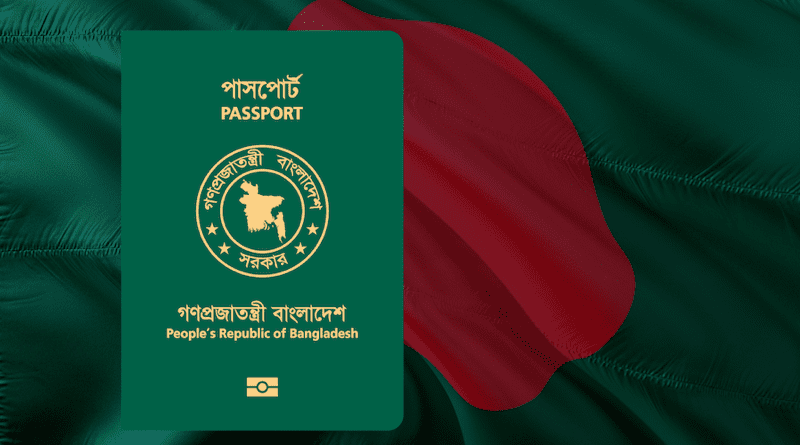Bangladesh E-Passport Service To Migrant Workers In Kuwait – OpEd
On 22 March, the Bangladeshi e-passport service program was inaugurated in the Bangladesh embassy of Kuwait in the presence of Bangladeshi ambassador Major General Muhammad Ashiqur zaman, which will make obtaining a passport in a Bangladeshi mission in Kuwait more easier.
Migrant workers from Bangladesh working in Kuwait are a target group for the E-passport programme. E-passports were introduced in the country in the year 2020 as part of an effort to streamline the lengthy and tedious process of passport registration, renewal, and even immigration procedures in airports. Not only that the entire procedure of immigration can now be completed in just 18 seconds thanks to the e-passport service but also migrant laborers who currently reside in the gulf country can have swifter access to passport related services from the Kuwait mission.
In 2018, Bangladesh launched it’s electronic passport program after signing a ten-year deal with Veridos GmbH, a German company that will be responsible for providing e-Passport services and support in Bangladesh. 30 million e-passports are to be distributed in 10 years under the program.
Bangladesh is the 119th country in the world to introduce e-passport and remarkably, the first one in South Asia. The Awami League government announced the project as a gift to the people of Bangladesh on the occasion of the 50th anniversary of the country’s independence; this was also a significant milestone in the road toward “digital Bangladesh,” as envisioned by the country’s prime minister, Sheikh Hasina.
The rollout of the E-passport program, originally planned to occur at 80 embassies of Bangladesh worldwide but was delayed by the corona pandemic. The country used to have handwritten, machine-readable (MRP), and e-passports, but all handwritten passports are invalid at this point as the last one was issued in 2010, and their 10-year validity period has already run out. The E-passports are meant to be a perfect substitute for the MRP passports, issued by the Bangladesh Army a decade ago.
The MRP passports were introduced to replace the manual passport system, but it’s vulnerability to forgery and identification problems due to Rohingya issues, e-passports are now introduced by the government. E-passports are supposed to be more secure than the current MRP ones as they contain an electronic chip in the passport booklet, along with the first two pages having information such as the holder’s iris and biometric finger prints. The e-passports will be have validity for 5 and 10 years.
Now that the e-passport service has been introduced in Kuwait, the availability of seamless passport services to the workers will increase. Adult migrant workers would be handed with 10-year eligibility for 48-page or 64-page passports, based on their requirements. Any migrant can apply for a passport through an online portal, which essentially eliminates the scams of passport brokers along with the need for any application fee.
The economic bloom of Bangladesh is the result of hardworking migrant workers from all over the world working overseas. The number of Bangladeshis who left the country in 2022 was 11.35 lakh, making it the biggest annual total in the history of the nation. There were 20,422 people who left Bangladesh for Kuwait, which is considered to be one of the top seven countries that recruit Bangladeshi migrants. So, the launch of the e-passport service would relieve migrant workers of a significant portion of the load of the former passport system, which was historically a dreadful experience for these people.
A notable occurrence happened in 2021 when many Bangladeshi migrant workers had to struggle for months on to get their MRP passports or completing passport renewal processes which ended up delaying their migration process. The frustration of the workers in Kuwait and other countries for such a debacle were seen in different social media groups.
Passport processes such as renewal or modification now can be done online and tracked through the E-passport portal by the applicants. This will be extremely beneficial to migrant workers in Kuwait, as their passports are taken by their employers, making any passport-related issues difficult because they are only returned the passports if they are allowed to leave the country. They can also schedule online to provide biometric data which will lessen their waiting times in the embassies.
These passport documents and services will be completed by the Department of Immigration and Passports (DIP) and later will be shipped to Kuwait mission to be distributed to the applicants. The government has also decided to issue electronic visa, or e-visa for total digitalization of the passport service, easing the hassles of the migrants in future. Last November, a Memorandum of Understanding (MoU) was signed between Bangladesh and the United Arab Emirates (UAE) for e-Visa/e/-TA.
E-gates have already been created in Benapole port, Sylhet airport, and Dhaka airport to facilitate digital travel and immigration. The Department of Immigration and Passports (DIP) also intends to hire licenced “agents” to increase manpower for passport services to people. In addition, the Bangladesh Police Special Branch (SB) has released the “Hello SB” app to simplify access to numerous services such as e-passports, MRP, passport renewal and correction, immigration services, dual citizenship, and many more.
Bangladesh is still ranked 101st in the Henley Passport Index, indicating the weak quality of the Bangladeshi passport. Attempts to internationalize passport standards have already been explored, but until this new e-passport system is supported by skilled and adaptive manpower, the misery of migrant workers will remain, no matter how digitalized or accessible the process becomes.

